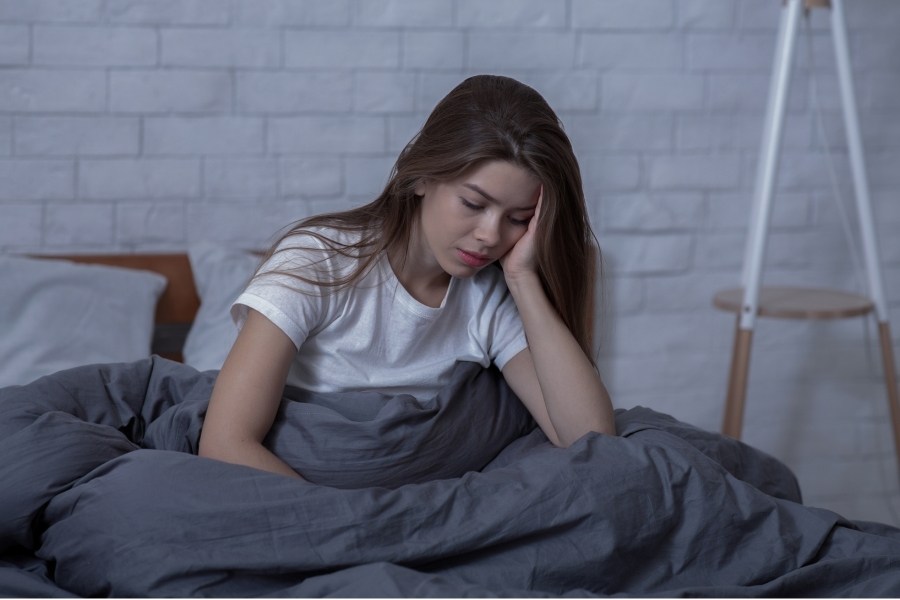Insomnia, the persistent inability to fall and stay asleep, can have detrimental effects on one’s overall well-being and daily functioning. As a psychologist specializing in sleep disorders, I have seen firsthand the toll that chronic sleep deprivation can take on individuals.
In this blog post, I will share expert advice and strategies to help you overcome insomnia and improve the quality of your sleep.
Table of Contents
Key Takeaways:
- Establish a bedtime routine: Creating a consistent routine before bed can signal to your body that it’s time to wind down and prepare for sleep.
- Avoid screens before bed: The blue light emitted from screens can disrupt your body’s natural sleep-wake cycle, so try to avoid screens at least an hour before bedtime.
- Practice relaxation techniques: Engaging in activities such as deep breathing, meditation, or progressive muscle relaxation can help calm your mind and body before bedtime.
- Avoid caffeine and alcohol close to bedtime: These substances can interfere with your ability to fall asleep and stay asleep, so it’s best to avoid them several hours before bedtime.
- Seek professional help if needed: If your insomnia persists despite trying these strategies, it may be helpful to consult with a psychologist or healthcare provider who specializes in sleep disorders.
The Science of Sleep
You may find yourself struggling with insomnia, unable to quiet your mind and drift off to sleep. Understanding the science behind sleep can shed light on why this happens and how you can improve your sleep quality.
Sleep Cycles and Stages
To optimize your sleep, it’s imperative to comprehend the different stages of sleep that make up a sleep cycle. A complete sleep cycle consists of several stages, including light sleep, deep sleep, and REM (rapid eye movement) sleep.
Each stage plays a vital role in restoring your body and mind, and disturbances in these stages can lead to poor sleep quality.
The Role of Neurotransmitters and Hormones in Sleep
Any disruption in the balance of neurotransmitters and hormones involved in regulating sleep can impact your ability to fall and stay asleep.
Neurotransmitters like serotonin and GABA help calm the brain and prepare it for sleep, while hormones like melatonin signal to your body that it’s time to rest.
These chemical messengers work together in a complex interplay to promote healthy sleep patterns.
For instance, an imbalance in serotonin levels can lead to insomnia, as this neurotransmitter helps regulate mood and promotes relaxation.
Similarly, disruptions in the release of melatonin, often influenced by exposure to light, can interfere with your circadian rhythm and make it harder to fall asleep at night.
Common Causes of Insomnia
Psychological Factors
Now, let’s research into the psychological factors that can contribute to insomnia. Stress, anxiety, and depression are common culprits that can disrupt your sleep patterns.
Racing thoughts, worries, or mood disturbances can keep your mind active when it should be winding down for the night. It’s imperative to address these psychological issues to promote healthier sleep habits.
- Stress, anxiety, and depression
- Racing thoughts and worries
- Mood disturbances
Though it may be challenging, practicing relaxation techniques, mindfulness, or seeking therapy with a psychologist can help alleviate these psychological factors contributing to your insomnia.
Lifestyle and Environmental Factors
One of the primary causes of insomnia is lifestyle and environmental factors.
Irregular sleep schedules, excessive screen time before bed, noisy environments, or uncomfortable sleep environments can all disrupt your sleep architecture.
Making simple changes to your daily routines and sleep environment can significantly impact your quality of sleep.
- Irregular sleep schedules
- Excessive screen time before bed
- Noisy environments
- Uncomfortable sleep environments
To improve your sleep hygiene, establish a consistent bedtime routine, limit screen time before bed, create a calm and quiet sleeping environment, and invest in a comfortable mattress and bedding. After making these adjustments, you may notice a significant improvement in your ability to fall asleep and stay asleep.
Medications and Substance Use
Understanding the impact of medications and substance use on your sleep is crucial in addressing insomnia.
Substance abuse, such as alcohol or caffeine consumption, can interfere with your sleep patterns and contribute to insomnia.
Additionally, certain medications, like stimulants or antidepressants, may have side effects that disrupt your ability to get a restful night’s sleep.
- Alcohol or caffeine consumption
- Medications with sleep-disrupting side effects
For instance, if you’re taking medication that impacts your sleep, consult with your healthcare provider to explore alternative options or adjust your dosages to minimize sleep disturbances. Addressing medications and substance use, you can take proactive steps to improve your sleep quality and overall well-being.
Assessing Your Sleep Hygiene
Many factors can contribute to poor sleep quality, with an individual’s sleep hygiene playing a crucial role in determining the overall sleep experience.
Evaluating your sleep hygiene involves assessing various aspects of your bedtime routine and sleep environment that may be impacting your ability to get a restful night’s sleep.
Evaluating Your Sleep Environment
Your sleep environment sets the stage for a peaceful night’s rest. Assess factors such as noise levels, lighting, temperature, and comfort of your mattress and pillows. Ensure that your bedroom promotes relaxation and restfulness, creating an optimal space for sleep.
Consider investing in blackout curtains, white noise machines, or earplugs to minimize disruptions that could be preventing you from falling asleep or staying asleep throughout the night.
Identifying Bad Sleep Habits
An vital aspect of assessing your sleep hygiene is identifying any bad sleep habits that may be negatively impacting your ability to sleep well. Common bad sleep habits include using electronic devices before bed, consuming caffeine or heavy meals close to bedtime, or irregular sleep schedules.
Addressing these habits and making necessary changes can significantly improve your overall sleep quality and help you establish a healthier sleep routine.
Assessing your sleep hygiene involves a comprehensive evaluation of your sleep environment, bedtime habits, and overall lifestyle factors that may be affecting your ability to get a restful night’s sleep.
Pinpointing areas of improvement and making necessary adjustments, you can enhance your sleep quality and wake up feeling more refreshed and rejuvenated each morning.
Cognitive-Behavioral Therapy for Insomnia (CBT-I)
The Fundamentals of CBT-I
Unlike some other approaches that focus solely on medication, Cognitive-Behavioral Therapy for Insomnia (CBT-I) is a structured program that identifies and aims to modify the thoughts and behaviors that contribute to sleep problems.
This therapeutic approach is rooted in the understanding that chronic insomnia is often maintained by negative thought patterns and maladaptive behaviors that perpetuate the cycle of poor sleep.
Techniques and Practices of CBT-I
One of the key techniques of CBT-I is sleep restriction, which involves limiting time in bed to only the actual time spent asleep. This helps to build a stronger association between the bed and sleep, leading to improved sleep efficiency.
Another important practice is stimulus control, which involves creating a sleep-conducive environment and establishing a consistent sleep schedule to reinforce the body’s natural sleep-wake cycle.
Any effective CBT-I program also includes cognitive restructuring, which helps individuals challenge and reframe negative thoughts and beliefs about sleep.
Addressing these cognitive factors, individuals can develop a more positive outlook on sleep and reduce anxiety or worry that may be interfering with their ability to fall asleep.
Therapy for insomnia does not just focus on the symptoms but probes into the root causes of the sleep issues.
Addressing both the behaviors and thought patterns that contribute to insomnia, CBT-I equips individuals with sustainable strategies for improving sleep quality and breaking the cycle of chronic sleeplessness.
Relaxation Techniques and Mindfulness
Not getting enough sleep can have a significant impact on your mental and physical health.
In order to combat insomnia and improve your sleep quality, incorporating relaxation techniques and mindfulness practices into your daily routine can be highly beneficial.
Progressive Muscle Relaxation
To ease into a state of relaxation before bedtime, consider practicing progressive muscle relaxation. This technique involves consciously tensing and then relaxing each muscle group in your body, starting from your toes all the way up to your head.
Releasing tension in the muscles, you can create a sense of calmness and reduce physical stress, which can help you drift off to sleep more easily.
Mindfulness Meditation and Breathing Exercises
Relaxation can also be achieved through mindfulness meditation and breathing exercises. Focusing on the present moment and letting go of racing thoughts, mindfulness can help quiet the mind and prepare it for rest.
Breathing exercises, such as deep diaphragmatic breathing, can also promote relaxation by slowing down the heart rate and calming the nervous system.
For instance, practicing mindfulness meditation before bedtime can help you let go of the worries and stresses of the day, allowing your mind to settle down and prepare for sleep.
Combining mindfulness with deep breathing exercises can create a powerful relaxation routine that can improve your sleep quality and overall well-being.
Nutrition and Exercise’s Role in Sleep Quality
Diet and Sleep Connection
After a long day, what you eat can significantly impact how well you sleep at night. An imbalanced diet high in sugar, refined carbohydrates, and caffeine can disrupt your body’s natural sleep cycle.
These foods can lead to spikes in blood sugar levels and interfere with the production of sleep-inducing hormones like melatonin.
On the other hand, incorporating foods rich in tryptophan, magnesium, and vitamins B6 and B12 can promote better sleep.
Tryptophan, found in foods like turkey and dairy, helps your body produce serotonin, a precursor to melatonin. Magnesium and B vitamins play a crucial role in regulating neurotransmitters that control sleep and wake cycles.
The Impact of Physical Activity on Sleep
With regular physical activity, not only do you improve your physical health, but you also enhance your sleep quality. Exercise has been shown to reduce stress, anxiety, and symptoms of depression – all of which are common contributors to sleep problems.
Additionally, engaging in exercise leads to the release of endorphins, which promote relaxation and increase the chances of falling asleep faster and enjoying deeper sleep cycles.
Exercises such as yoga, walking, running, or strength training can all have positive effects on your sleep patterns. However, it’s important to avoid vigorous exercise close to bedtime, as it may have a stimulating effect that can interfere with your ability to fall asleep.
Aim to complete your workout at least a few hours before bedtime to allow your body and mind to wind down for a restful night’s sleep.
When to Seek Professional Help
Keep in mind that if you have tried various sleep hygiene practices without success, it might be time to explore other options. According to a study published in Scientific American, simply focusing on sleep hygiene may not be the most effective approach for treating insomnia.
Seeking help from a psychologist specializing in sleep disorders can provide you with more advanced techniques and strategies to improve your sleep quality.
Warning Signs for Serious Sleep Disorders
Warning signs that may indicate a serious sleep disorder include persistent difficulty falling asleep or staying asleep, frequent nighttime awakenings, excessive daytime sleepiness, loud snoring, pauses in breathing during sleep, and sudden movements or behaviors during sleep.
If you experience any of these symptoms regularly, it is crucial to consult a healthcare professional for a proper evaluation and guidance.
The Role of the Psychologist in Treating Insomnia
Sleep psychologists play a crucial role in treating insomnia by employing evidence-based therapies such as cognitive-behavioral therapy for insomnia (CBT-I). This approach addresses the underlying causes of insomnia and helps individuals develop healthy sleep habits.
Psychologists also work with patients to identify and challenge negative thoughts and behaviors that may contribute to their sleep difficulties.
This comprehensive approach aims to not only improve sleep quality in the short term but also equip individuals with the skills to maintain healthy sleep patterns in the long run.
If you are struggling with chronic insomnia, seeking the expertise of a psychologist can provide you with the necessary support and guidance to overcome your sleep challenges.
FAQ
Q: What is insomnia?
A: Insomnia is a common sleep disorder characterized by difficulty falling asleep, staying asleep, or both, leading to poor quality sleep.
Q: What causes insomnia?
A: Insomnia can be caused by various factors such as stress, anxiety, depression, poor sleep habits, medical conditions, medications, or caffeine and alcohol consumption.
Q: How can insomnia affect your health?
A: Insomnia can have a significant impact on your physical and mental health, leading to fatigue, irritability, difficulty concentrating, a weakened immune system, and an increased risk of developing chronic conditions like heart disease and diabetes.
Q: What are some tips to improve sleep and manage insomnia?
A: Some tips to improve sleep and manage insomnia include establishing a bedtime routine, creating a comfortable sleep environment, limiting screen time before bed, avoiding caffeine and heavy meals close to bedtime, and practicing relaxation techniques like deep breathing or meditation.
When should I seek help for my insomnia?
If you have tried self-help strategies and are still experiencing persistent sleep difficulties that significantly impact your daily life, it is advisable to seek help from a healthcare professional such as a psychologist or a sleep specialist to address your insomnia effectively.



